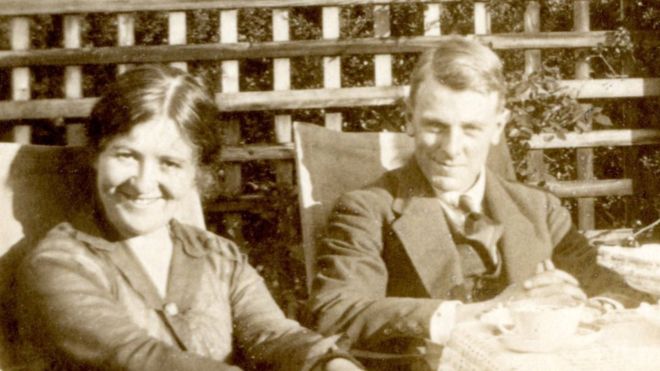The BBC has produced a radio drama based on the real-life love letters a couple exchanged during World War I.
Eric Appleby, an engineering student from Liverpool, was a British soldier who joined the military when the war began in 1914 and was sent to Ireland for training. Phyllis Kelly was an Irish woman from Athlone, County Westmeath. The two fell in love when they met at a dance in her hometown; they quickly fell for each other.
Their relationship was interrupted when he was sent to the front lines in France to fight with the Royal Field Artillery in March of 1915. The two kept in touch with a series of love letters that became increasingly dramatic and disturbing as Eric fought to stay alive in France.
Their story was similar to that of many couples separated by that war and was only discovered by chance. Ian Dougan, a producer for the BBC, found a book of their collected letters on a shelf in the Linen Hall library in Belfast. He decided to bring their story back to life 100 years after it had originally occurred.
“In amongst all the World War One books I came across the book Love Letters from the Front,” producer Ian Dougan recalls. “I got this down and was amazed to find that it had never been read, and there were over 200 letters – beautiful letters – that I just felt had to be made into something.”
Jean Kelly, who is married to one of Phyllis’s nephews, curated the book that inspired the landmark 137-part series on BBC Radio Ulster. Two Belfast actors, Ruairi Tohill and Roisin Gallagher, have been cast to play the couple. They have recorded extracts of the 200 love letters in five-minute installments. The series will be broadcast just before noon every weekday on BBC Radio Ulster from now until October.
“The letters begin gently as love letters and then become almost a pattern of how World War One panned out,” Mr Dougan says. “From the ‘love days’ as they called them – boat-rides and sweetheart moments – to the atrocities that Eric witnessed.”
In one letter Eric writes, “Sweetheart, forgive me for not having written, it is impossible to find a moment. We are really in it now. There is a fearful din going on at present and shells are falling all around us. Quite close to our guns, about 30 yards behind, there is an enormous 17-inch shell hole – 40 feet in diameter and 20 to 30 feet deep. Really, it is appalling to look at.”
Towards the end, the letters become more intense. The soldier’s letters deliver some of the reality of war back to Athlone. “Eric’s right at the front with the rats and the dead and he’s gone slightly mad. He takes the gun out at night with a knife and is cutting off souvenirs off the corpses,” Mr. Dougan says.
“Phyllis is totally unable to conceive why through the post she’s found herself receiving a dead German’s lapels. She knows by now, because she can follow it in code, where he is and she knows he’s right at the front.”
The producer believes that the story of this couple is symbolic of the war as a whole. It follows the innocence of the early days to the “midway madness” of the Somme offensive of 1916. He says, “Not only do you get an insight into this young couple but you also get an insight into the horrors of war.”
Love Letters from the Front will be broadcast at 11:55 BST each weekday on BBC Radio Ulster from Thursday 21 April, and will be repeated each weeknight at 23:50 BST.
